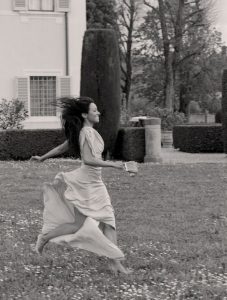cctm collettivo culturale tuttomondo Gesualdo Bufalino È la mia ragazza
Le piacciono i segreti che si sussurrano all’orecchio, gli oracoli, le stizze, le bugie.
Non vuole in me che questo: un affiliato di cospirazioni e allegrezze. Si rammenta gli anniversari più futili, le cantafavole improvvisate una volta e lasciate a metà. M’incolpa di colpe inesistenti per potermele perdonare dopo un istante. Mi regala un garofano avvolto nella stagnola, un pacchetto di Tre Stelle, uno stupido Toi et moi. È la mia ragazza, guardatela, sta per attraversare la strada col semaforo rosso…
She delights in secrets whispered in the ear, in oracles, in sulks, in lies.
From me she wants nothing else but this: a partner in conspiracies and in joys. She remembers the most trivial anniversaries, the once-spun fairy tales left half-told. She accuses me of faults that never were, only to forgive them an instant later. She brings me a carnation wrapped in foil, a packet of Tre Stelle, a foolish Toi et moi. She is my girl — look at her — about to step into the street, though the light is red…
Gesualdo Bufalino
da Diceria dell’untore, Bompiani, 1992

foto: Kat Graham photographed by Carly Dame for Harper’s Bazaar Serbia magazine, 2023 – fair use
Gesualdo Bufalino (Comiso, 1920 – Vittoria, 1996) è stato uno scrittore, poeta e aforista italiano.
Si è rivelato tardivamente come narratore con il breve romanzo “Diceria dell’untore” (1981, Premio Campiello). In seguito ha pubblicato dei libri di poesia:(“L’amaro miele”, 1982), di memorie (“Museo d’ombre”, 1982), “Il fiore breve ovvero le malizie della memoria”, 1984), di aforismi (“Il malpensante”, 1987), di scritti giornalistici (“Cere perse”, 1985; “La luce e il lutto”, 1988); un “Dizionario dei personaggi di romanzo da Don Chisciotte all’Innominato” (1982) e romanzi che hanno compiutamente rivelato il carattere lirico-autobiografico della sua scrittura: “Argo il cielo ovvero i sogni della memoria” (1984), “Le menzogne della notte” (1988, Premio Strega), “Calende greche” (1992), “Tommaso e il fotografo cieco” (1996).
Gesualdo Bufalino (Comiso, 1920 – Vittoria, 1996) was an Italian writer, poet, and aphorist.
He received his education in Ragusa before attending the University of Catania and the University of Palermo. After completing his studies, he became a high school principal in his hometown, a position he held until his retirement in 1976.
His literary journey began after World War II when he spent time in a sanatorium due to tuberculosis. This experience inspired his first novel, Diceria dell’untore (The Plague Sower), which he began writing in the 1950s but published only in 1981, thanks to the encouragement of his friend, the renowned Sicilian author Leonardo Sciascia. The novel is a surreal narrative set in a post-war sanatorium and explores themes of death and memory. It won the prestigious Premio Campiello. In 1988, Bufalino’s novel Le menzogne della notte (Night’s Lies) won the Strega Prize, further solidifying his reputation as a significant literary figure. His works often reflect a baroque style and are rich with literary allusions.
Bufalino’s later works include Blind Argus, The Keeper of Ruins and Other Inventions, and Tommaso and the Blind Photographer. His storytelling often weaves together elements of myth, memory, and the human condition. Despite starting his literary career later in life, most of his notable works were produced within the last 15 years before his death.
_
cctm collettivo culturale tuttomondo Gesualdo Bufalino È la mia ragazza
